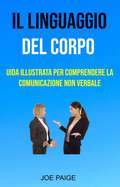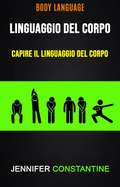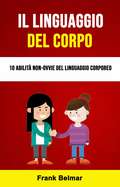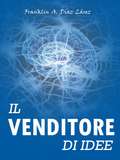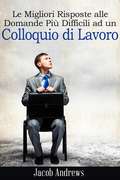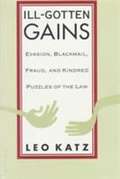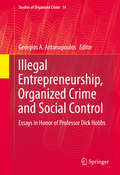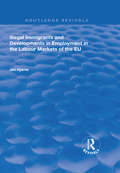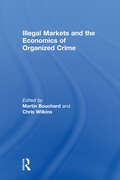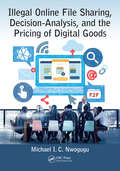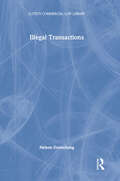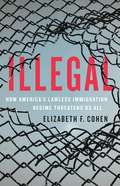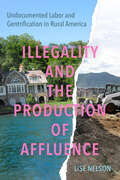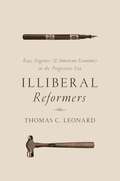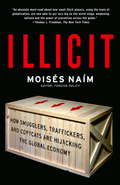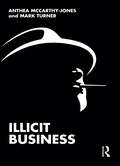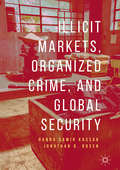- Table View
- List View
Il Linguaggio Del Corpo : uida Illustrata Per Comprendere La Comunicazione Non Verbale
by Joe PaigeÈ importante sapere se alle persone interessa davvero ciò che fai e/o dici. Con le parole si riesce a dire molto meno di quanto il corpo sia in grado di esprimere. Con il fisico ci si esprime in modo incoscio attraverso la postura, i gesti, gli sguardi, le espressioni facciali, il contatto fisico e la vicinanza con l'interlocutore. Quindi perché non imparare ad utilizzare il linguaggio del corpo a TUO vantaggio? Il linguaggio del corpo è un potente strumento che puoi applicare ad ogni aspetto della tua vita. Questo libro ti permetterà di analizzarlo, scoprendo cosa si nasconde dietro le parole. Migliorando le tue abilità comunicative, noterai dei benefici sia nel rapporto col partner che in quello coi famigliari, e avrai persino l'ccasione di avanzare nel mondo del lavoro, superando colloqui e instaurando buoni rapporti con i colleghi e col capo. Seguendo queste procedure, sarai capace di migliorare la tua vita sociale, amorosa e lavorativa. Clicca sul pulsante in alto e ottiene subito una copia del libro!
Il Linguaggio Del Corpo: Capire Il Linguaggio Del Corpo ( Body Language)
by Jennifer ConstantineQuesto manuale ti fornirà tutte le informazioni necessarie per poter leggere il linguaggio del corpo. Ti permetterà inoltre di diventare una macchina della verità umana, capace di scoprire le menzogne nell'attimo stesso in cui vengono dette, e di capire cosa provano davvero gli altri. Cosa puoi dedurre da delle braccia incrociate, dalla distanza che intercorre con l'interlocutore, dalle espressioni facciali o dallo sbattere delle palpebre? Beh, praticamente tutto! Con centinaia di illustrazioni colorate, il manuale è in grado di aiutare chiunque, qualsiasi sia il suo background culturale, a sapere di più sui suoi amici, sul partner, sui colleghi, sugli avversari e persino sui nemici. Sapevi che il corpo può comunicare più delle parole? Il modo in cui si muovono gli occhi, la bocca, la testa, le braccia e le gambe: tutto ha un significato. Che aspetti? Clicca su "compra ora" per iniziare il percorso che ti condurrà alla vita che hai sempre desiderato!
Il Linguaggio Del Corpo: Leggete il Linguaggio del Corpo delle Persone per Avere Successo nelle Relazioni
by Frank BelmarFidatevi, il linguaggio corporeo è davvero così potente. Dovreste già sapere che gli esseri umani leggono costantemente le situazioni e le altre persone in modo che, veramente in modo veloce, riescono a conoscere in quale categoria di persone inserirle: status basso, medio, o alto. Questo libro vi aiuterà a capire e ad attuare diversi tipi di comunicazione non verbale. Usando i principi e le istruzioni contenute in questo libro, imparerete i migliori tipi di linguaggi corporei da usare in differenti tipologie di situazioni sociali. Se siete pronti ad agire e cambiare la vostra vita in meglio, questo libro vi guiderà definitivamente nella giusta direzione!
Il Modo n. 1 di Profilare: Padroneggiare l'Arte di Concludere con un Potenziale Cliente per Affari o Vendite Senza Sforzo
by Jonathan S. WalkerPadroneggia l'arte per prospettare e chiudere senza sforzo un potenziale cliente OGGI! Sei debole nelle tue capacità di prospezione? Hai paura di essere rifiutato dai tuoi potenziali clienti? Ancora più importante, vuoi avere il 100% di successo nella tua prospezione ogni volta? E se ti dicessi che entro la fine di questo libro, avrai tutte le conoscenze necessarie per diventare un esperto di prospezione, essere in grado di guidare le vendite senza sforzo e poi un po '? Presentazione del modo n. 1 di prospect: The Ultimate Mastery Guide To Prospecting Like A Pro. In questo libro imparerai: L'essenza di ciò che è realmente la prospezione Tecniche segrete di prospezione che dovresti avere nel tuo arsenale Suggerimenti su come avere successo quando ci si avvicina a un potenziale potenziale cliente Sfatare i miti di prospezione che ti trattengono Strumenti potenti da utilizzare a tua disposizione E molto altro ancora. Prendi la tua copia di questo libro oggi! Non perdere tutte le cose incredibili racchiuse in questo potente libro. Scorri verso l'alto e premi il pulsante "Acquista ora" oggi!
Il Tempo è Denaro
by Adidas WilsonQuando chiedete alla maggior parte delle persone, vi diranno che non si sarebbero mai aspettati che il movimento FIRE diventasse così popolare. Rinunciare ai piaceri della vita e risparmiare più del 50% del reddito per andare in pensione a 30 o 40 anni non è una cosa facile da fare. Nel 2020, il movimento FIRE è al suo apice. Purtroppo, questo significa che non c'è più un aumento, l'unica via da percorrere è quella di scendere. Ogni giorno si vede la storia di chi si è ritirato in anticipo e di come ci è riuscito. Ecco come si sa che il FIRE è al suo apice. Ogni investitore sa che quando si vedono le notizie sulla stampa, non si può investire perché è troppo tardi. Ma di solito è un ottimo momento per vendere. Gli investitori cercano di prevedere il futuro. Costruire la vera ricchezza non significa solo fare soldi. Ad un certo punto, hai visto persone povere e povere felici e ricchi infelici. Secondo le ricerche, il rapporto tra felicità e denaro è piccolo. I seguenti dieci principi vi aiuteranno a raggiungere la vera ricchezza, personalmente e finanziariamente. Diventare profondamente motivati - Il denaro non può essere considerato una motivazione profonda. La ricchezza finanziaria ha dei benefici esterni. Con il denaro si possono avere grandi conti bancari, case di lusso, ecc. ma non si può comprare la felicità. Poiché gli obiettivi esterni hanno dei limiti intrinseci, essi limitano la vostra motivazione.
Il Time Management Reso (Ridicolmente) Facile
by Elena Holler Michael R. ClarkeNon hai il tempo per leggere un libro che parla di gestione del tempo? Vuoi imparare le scorciatoie e le strategie per (finalmente) incrementare la tua produttività ed essere padrone del tuo tempo? Vuoi conoscere i segreti di livello ninja per fare di più in meno tempo, senza andare fuori di testa? Desideri disperatamente scoprire quella parte di te che è efficace, piena di risorse e libera dallo stress e che muore dalla voglia di uscire allo scoperto? Allora sei nel posto giusto! In "Il time management reso (ridicolmente) facile" imparerai: *Come manipolare il tuo cervello per ottenere la massima strabilianza *Come prioritarizzare (e pianificare) alla grande *Come delegare la robaccia importante (che non vuoi fare) *Come essere organizzato (anche se sei un pigrone) *E molto altro ancora! Ogni capitolo comprende delle azioni passo passo facili da seguire, per aiutarti ad aumentare il tuo IQ della gestione del tempo - senza dover partecipare ad un noioso seminario sull'argomento tenuto nell'università vicina. Quindi, perché non partire alla ricerca del massimo livello di strabilianza in termini di gestione del tempo...oggi stesso!?)
Il Trading sul Forex: per principianti (Come... #17)
by Owen JonesIl Trading sul Forex per principianti Questo ebook sul FOREX trading, e sugli argomenti a esso correlati, è organizzato in 18 capitoli di circa 500-600 parole ciascuno. Si tratta di un'opera che potrà essere di aiuto per elaborare strategie di trading, ma potrà essere anche un modo per farvi scoprire un nuovo hobby remunerativo. E, comunque, vi consentirà di risparmiare centinaia di dollari in consulenze professionali. Come bonus aggiuntivo: potrete utilizzare i contenuti dell’ebook sul vostro sito web, o su blog e newsletter, anche se sarebbe preferibile riscriverli usando parole vostre. All’occorrenza, potrete anche rivendere singoli articoli del libro. L’unico diritto che non possedete è di rivendere o distribuire l’opera nella sua interezza, ovvero così come vi viene consegnata.
Il Venditore di Idee
by Franklin A. Díaz LárezIl venditore di idee è una persona che si dedica allo studio e alla minuziosa analisi dei comportamenti e delle necessità umane, per usarli a proprio vantaggio. <P><P> Questo libro contiene una rigorosa analisi degli elementi necessari per diventare un buon venditore di idee, distinguendo chiaramente quest'ultimo da chi si dedica semplicemente a vendere articoli o servizi. <P><P> Un testo con cui si vuole aiutare il lettore nella compresione del fenomeno delle necessità, delle ragioni e dei "perché" dei comportamenti umani, con l'unico scopo di usarli a proprio vantaggio per produrre grandi quantità di denaro. <P><P> Contiene un'esposizione dettagliata delle strategie per persuadere, sedurre e convincere i compratori, partendo dalla conoscenza del loro modo di pensare e delle loro necessità intrinseche. <P><P> Attenzione: non è un libro ideale per le persone religiose o estremamente moraliste, né per coloro che pensano che non stia bene guadagnare eccessive quantità di denaro mentre c'è tanta gente al mondo che vive nella povertà.
Il Volo del Rondone (Italian translation of "Flight of the Rondone"): La lotta per salvare la vita di mio figlio: autobiografia di un neanche diplomato in lotta contro le multinazionali del farmaco
by Patrick GirondiIl volo del Rondone racconta una storia caratterizzata dall&’ascesa &“dalle stalle alle stelle&” che il New York Times ha indicato come &“merita gli schermi televisivi&”. L&’autore, che non si è neanche diplomato, è soprannominato &“U carnveil&” (il circo camminante) per il suo spirito e la sua natura bizzarra. Patrick Girondi inizia la sua carriera lucidando scarpe per strada, rubando pezzi d&’auto e fuggendo da situazioni pericolose ingannando anche la polizia di Chicago. La sua storia vincente diventa così famosa da essere raccontata al &“The Oprah Winfrey Show&”. Il suo destino si trasforma velocemente quando suo figlio, Santino, venne diagnosticato con una malattia del sangue. Girondi, alla ricerca di una cura, attraversa tragedie e sconfinate implicazioni nel mondo della terapia genica. Girondi scrive: &“Sono stato strangolato, sparato, fuggito da più di venti arresti e dileguato da tre cacce alle streghe dell&’FBI; sono passato dal lavorare ai porti, alla Borsa di Chicago. Vedrò mio figlio curato. Quanto può essere difficile?&” Dopo decenni di lotte, è riuscito a portare alla luce il primo lotto commerciale di un vettore impiegato nel campo della terapia genica con alte potenzialità di curare l&’anemia falciforme e la talassemia. Ancora, la riuscita della cura – edel destino del figlio – èin pericolo a causa dei camici bianchi, morti misteriose e banchieri di Wall Street spietati. Questa è una storia di amore, una sfida contro le probabilità o, come dice Girondi, pura fortuna. È un racconto crudo e reale con una piccola considerazione del bon ton.
Il colloquio: domande e risposte
by Jacob Andrews Consalvo CattutoRisposte parola per parola da usare in un colloquio di lavoro per essere assunto. Questo libro include risposte moderne, intelligenti, totalmente persuasive e che ti rendono affidabile agli occhi del tuo interlocutore. Queste risposte sono concepite per aiutarti a rispondere in modo sicuro e cordiale a domande difficili o imbarazzanti che fanno parte delle pratiche di screening e di ricerca del personale nel complesso mondo del lavoro di oggi. Preparati a rispondere alle domande più toste. Si sta avvicinando il colloquio? Preparati! I colloqui di lavoro sono insidiosi. Ti chiederanno esempi concreti e dettagli, compresi nomi di persone, date ed eventi. Ti chiederanno informazioni su progetti a lungo termine in cui sei stato coinvolto, ti chiederanno come hai gestito le scadenze, le pressioni e le personalità difficili. Ti metteranno alla prova. Sei pronto per le loro domande toste? Questo è solo un assaggio di quello che apprenderai... Con questo libro imparerai a rispondere alle domande più ostiche che rientrano in queste categorie: Rompighiaccio Personali Formazione Esperienza Comportamento Stress e sua gestione Non mostrarti nervoso, maldestro o troppo sicuro di te durante un colloquio. Leggi questo libro e preparati!
Il lavoro sulla costellazione familiare e il denaro
by Marc Baco"Il lavoro sulla costellazione familiare e il denaro" è un testo che investiga le diverse cause della povertà, viste dal punto di vista della Costellazione Sistemica. Attraverso vari casi di vita vissuta, l'Autore dimostra come sia possibile risolvere anche grandi difficoltà economiche lavorando su se stessi e sul proprio sistema familiare.
Il potere della persistenza
by Justin Sachs Maria Grazia PozziCos'è il Potere della Persistenza? Qual è il VERO "segreto" del successo e quanto è importante? Non è ora di scoprirlo? La maggior parte delle persone è talmente bloccata nel proprio passato e sommersa dagli impegni del quotidiano che ha scordato i propri sogni e i desideri e ha perso l'entusiasmo e la motivazione per realizzarli! Questo libro vuole aiutarvi a recuperare quello slancio. Se voi, o qualcuno che conoscete, avete desiderato una seconda occasione per costruire il vostro successo e la realizzazione personale, o più semplicemente volevate dare maggiore impulso ai vostri progetti per raggiungere gli obiettivi, allora dovete proprio leggere Il Potere della Persistenza di Justin Sachs. Questa raccolta di storie porta con sé un bagaglio di esperienze e ispirazioni che hanno cambiato la vita a centinaia di persone e adesso potete beneficiarne anche voi. Il libro è entrato nella vostra vita in un preciso momento per una ragione: aiutarvi a lasciar andare il passato, ritrovare i vostri punti di forza e agire per fare la differenza nel mondo. Il Potere della Persistenza racconta di come la persistenza ha plasmato la vita dei grandi leader nel privato e nel lavoro. Vi siete mai chiesti che differenza c'è fra chi ha un successo enorme e chi riesce a malapena a cavarsela? Questo libro spiega perché la persistenza è l'elemento principale dei maggiori successi e, soprattutto, mostra come anche voi potete arrivarci! Questo libro di Justin Sachs, così come la famosa serie Chicken Soup for the Soul, cambierà la vostra vita per sempre.
Il riscatto delle regine: come dar vita al tuo spirito imprenditoriale
by Dy Wakefield Rossella RomeoDar potere alle donne significa far risvegliare in loro lo spirito imprenditoriale. Le donne sono nate e cresciute per essere leader negli affari e questo libro aiuterà a capire come, perché e quando è importante agire affinchè questo spirito sia risvegli.
Ill-Gotten Gains: Evasion, Blackmail, Fraud, and Kindred Puzzles of the Law
by Leo KatzLeo Katz describes the underlying principles that not only guide the law but also moral decisions. Mixing wit with insight, anecdotes with analysis, Katz uncovers what is really at stake in crimes such as insider trading, blackmail, and plagiarism.
Illegal Entrepreneurship, Organized Crime and Social Control
by Georgios A. AntonopoulosThis book covers organized crime groups, empirical studies of organized crime, criminal finances and money laundering, and crime prevention, gathering some of the most authoritative and well-known scholars in the field. The contributions to this book are new chapters written in honor of Professor Dick Hobbs, on the occasion of his retirement. They reflect his powerful influence on the study of organized crime, offering a novel perspective that located organized crime in its socio-economic context, studied through prolonged ethnographic engagement. Professor Hobbs has influenced a generation of criminology researchers engaged in studying organized crime groups, and this work provides a both a look back and this influence and directions for future research. It will be of interest to researchers in criminology and criminal justice, particularly with a focus on organized crime and financial crime, as well as those interested in corruption, crime prevention, and applications of ethnographic methods.
Illegal Immigrants and Developments in Employment in the Labour Markets of the EU
by Jan HjarnøThis title was first published in 2003. The problem of illegal labour immigration is one of the most controversial and hotly debated issues to confront the EU. This book examines the Scandinavian model of social partnership by which labour market relations are governed, creating an effective barrier to the employment of illegal immigrants. Using Denmark, Portugal and Germany as case studies it questions the impact of illegal immigrants and whether they pose a serious threat to the free movement of labour, capital and commodities. It will prove invaluable to those interested in labour market relations throughout the world.
Illegal Markets and the Economics of Organized Crime
by Martin Bouchard Chris WilkinsThis book showcases recent advances in the theoretical and empirical understanding of the economic aspects of organised crime and illegal markets. It provides new insights into defining and quantifying the influence of organised crime by drawing on innovative approaches to studying criminal networks and organisations such as the Hells Angels. The book includes analysis of the structure of illegal drug markets from international leaders in the field. Finally the text includes empirical case studies of the diverse markets where organised crime is currently active including the illegal market for crystal methamphetamine in Australia, tiger products in China and the falcon and fur trades in Russia. This book was based on a special issue of Global Crime.
Illegal Online File Sharing, Decision-Analysis, and the Pricing of Digital Goods
by Michael I. NwoguguIllegal online file sharing costs companies tens of billions of dollars of lost revenues around the world annually and results in lost productivity, various psychological issues, and significant reduction of incentives to create and innovate. Legislative, technical, and enforcement efforts have failed. This book presents psychological theories about why people illegally share files online; analyzes and characterizes optimal sanctions for illegal online file sharing; introduces new models for pricing of network-access and digital-content to help reduce illegal online file sharing; introduces new content control and P2P systems; and explains why game theory does not work in pricing of network access.
Illegal Transactions (Lloyd's Commercial Law Library)
by Nelson EnonchongConcerned with the area of illegal transactions, this text addresses practical issues, for example: who can raise the issue of illegality?; must illegality be pleaded? And when can a party recover money or property transferred pursuant to an illegal transaction? Divided into three main sections the text: deals with illegality as a defence to claims in various departments of the civil law; and examines the forfeiture rule as a tool which one party could compel another to disgorge profits which the other has acquired or would otherwise acquire from his illegal conduct. The third section of the text discusses the circumstances when, by way of exception, the court will enforce the claim of a person even though that person has been guilty of an illegality. Overall the text provides an account of the illegalities in civil law and a critical analysis of the current rules, with suggestions for reform.
Illegal: How America's Lawless Immigration Regime Threatens Us All
by Elizabeth F. CohenA political scientist explains how the American immigration system ran off the rails -- and proposes a bold plan for reform Under the Trump administration, US immigration agencies terrorize the undocumented, target people who are here legally, and even threaten the constitutional rights of American citizens. How did we get to this point? In Illegal, Elizabeth F. Cohen reveals that our current crisis has roots in early twentieth century white nationalist politics, which began to reemerge in the 1980s. Since then, ICE and CBP have acquired bigger budgets and more power than any other law enforcement agency. Now, Trump has unleashed them. If we want to reverse the rising tide of abuse, Cohen argues that we must act quickly to rein in the powers of the current immigration regime and revive saner approaches based on existing law. Going beyond the headlines, Illegal makes clear that if we don't act now all of us, citizen and not, are at risk.
Illegality and the Production of Affluence: Undocumented Labor and Gentrification in Rural America
by Lise NelsonOver several decades, the influx of wealthy, white "lifestyle" migrants has transformed the economic, social, and ecological fabric of many rural communities across the United States—from alpine towns of the Rockies to forest and lake communities of the Southeast—in a process akin to urban gentrification. Illegality and the Production of Affluence explores an underappreciated dimension of this process: its dependence on low-wage Latine immigrant workers, many undocumented, who build and maintain gentrified landscapes and lifestyles. Drawing on fine-grained qualitative data, Lise Nelson explores how employers recruited an unfamiliar workforce to places "off the map" of immigrant settlement. The book also reveals insights into how business practices and profitability shifted through the use of racialized, "illegal," and highly precarious labor. Finally, the book investigates the disjuncture between Latine immigrants' vital role in rural gentrifying economies and their social, civic, and racialized exclusion in the spaces of everyday life.
Illiberal Reformers: Race, Eugenics, and American Economics in the Progressive Era
by Thomas C. LeonardIn Illiberal Reformers, Thomas Leonard reexamines the economic progressives whose ideas and reform agenda underwrote the Progressive Era dismantling of laissez-faire and the creation of the regulatory welfare state, which, they believed, would humanize and rationalize industrial capitalism. But not for all. Academic social scientists such as Richard T. Ely, John R. Commons, and Edward A. Ross, together with their reform allies in social work, charity, journalism, and law, played a pivotal role in establishing minimum-wage and maximum-hours laws, workmen's compensation, progressive income taxes, antitrust regulation, and other hallmarks of the regulatory welfare state. But even as they offered uplift to some, economic progressives advocated exclusion for others, and did both in the name of progress. Leonard meticulously reconstructs the influence of Darwinism, racial science, and eugenics on scholars and activists of the late nineteenth and early twentieth centuries, revealing a reform community deeply ambivalent about America's poor. Economic progressives championed labor legislation because it would lift up the deserving poor while excluding immigrants, African Americans, women, and "mental defectives," whom they vilified as low-wage threats to the American workingman and to Anglo-Saxon race integrity. Economic progressives rejected property and contract rights as illegitimate barriers to needed reforms. But their disregard for civil liberties extended much further. Illiberal Reformers shows that the intellectual champions of the regulatory welfare state proposed using it not to help those they portrayed as hereditary inferiors, but to exclude them.
Illicit
by Moises NaimA groundbreaking investigation of how illicit commerce is changing the world by transforming economies, reshaping politics, and capturing governments.In this fascinating and comprehensive examination of the underside of globalization, Moises Naím illuminates the struggle between traffickers and the hamstrung bureaucracies trying to control them. From illegal migrants to drugs to weapons to laundered money to counterfeit goods, the black market produces enormous profits that are reinvested to create new businesses, enable terrorists, and even to take over governments. Naím reveals the inner workings of these amazingly efficient international organizations and shows why it is so hard -- and so necessary to contain them. Riveting and deeply informed, Illicit will change how you see the world around you.From the Trade Paperback edition.even take over governments. From pirated movies to weapons of mass destruction, from human organs to endangered species, drugs or stolen art, Illicit reveals the inner workings of these amazingly efficient international organizations and shows why it is so hard--and so necessary--to contain them.Illicit offers a fresh, ingenious and compelling vision of this untold story of globalization. It provides a powerful new lens with which to assess how today's world really works and where it may be headed. Illicit will surely ignite urgent debate at the highest levels--and change the way you think about the world.From the Hardcover edition.
Illicit Business
by Mark Turner Anthea McCarthy-JonesIllicit business is big business. It covers a diverse range of activities from money laundering, drug trafficking and human trafficking through to the manufacture of counterfeit goods and the multiple activities in informal and shadow economies. This book introduces the world of illegal business.The authors contextualise the evolution in practices of illegal business around the world, highlighting the importance of organised crime, shadow economies, and informal sectors. Incorporating scholarly insights with real world examples, the book provides a much-needed business and economics analysis of a subject that is otherwise dominated by criminologists.With a range of case studies, this book provides a global approach that will be valuable reading for students seeking to understand the business of crime.
Illicit Markets, Organized Crime, and Global Security
by Jonathan D. Rosen Hanna Samir KassabThis book explains the existence of illicit markets throughout human history and provides recommendations to governments. Organized criminal networks increased in strength after the enforcement of prohibition, eventually challenging the authority of the state and its institutions through corruption and violence. Criminal networks now organize under cyber-infrastructure, what we call the Deep or Dark Web. The authors analyze how illicit markets come together, issues of destabilization and international security, the effect of legitimate enterprises crowded out of developing countries, and ultimately, illicit markets' cost to human life.
